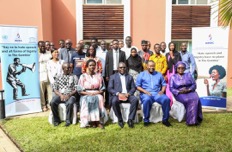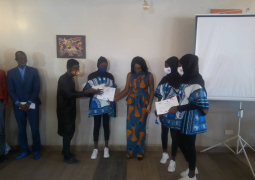
The research seeks to address the spread of hate speech in The Gambia through a right base approach.
According to NHRC, realities that raised their concerns over the growth of hate speech are analysis of traditional and social media posts over recent years.
The study also revealed that the presence of hate speech in The Gambia include but not limited to hate speech based on political differences, hate speech based on religious differences, ethnicity-based hate speech, hate speech based on gender and hate speech based on sexual orientation.
The validation workshop held at African Princess Hotel also saw presentations on the key findings of the research study, main challenges and recommendations.
Emmanuel Daniel Joof, chairperson for the National Human Rights Commission (NHRC) in his remarks stressed that the growth of hate speech, is widely seen and amplified in various media outlets, particularly on social media which he said is worrying and compounded by the fact that there is currently no effective system in place to monitor hate speech.
“Hate speech is indeed a menace and it has and continues to threaten peace and security of many nations around the world,” he pointed out.
He explained that hate speech is in itself an attack on tolerance, inclusion, diversity and the very essence of our human rights norms and principles.
More broadly, he added, it undermines social cohesion, erodes shared values, and can lay the foundation for violence, setting back the cause of peace, stability, sustainable development and the fulfilment of human rights for all.
Mr Joof highlighted that the National Human Rights Commission in the exercise of its mandate regularly scans both the print media and social media as well as frequently issues press releases and engages actors to counter hate speech when such instances arise.
However, he said, such interventions need to be reinforced as the danger of not effectively countering hate speech has been seen to yield disastrous outcomes in some countries.
He noted that there is a need to enhance the capacities and competencies of national actors such as the NHRC, the Independent Electoral Commission, the Gambia Press Union, WANEP, the National Council for Civic Education and the Inter-Party Committee to enable them effectively respond to the conflict hate speech triggers.
Michel Kenmoe, Head of Communications and Information Sector for UNESCO said that the initiative aligned with national priorities as well as United Nations Strategy and Plan of Action on Hate Speech.
He pointed out that hate speech is a threat to social cohesion and peace, noting that it is a menace to democratic processes.
He revealed that the UN Strategy seeks to address the root causes and rivalries of hate speech as well as device appropriate means and provide adequate funds to mitigate the impact of hate speech on societies.
He called on both state and non-state actors alike to share responsibility, engagement and play a role to empower citizens to stand firm when resilience of hate speech arises.
Read Other Articles In National News




